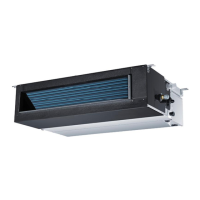89
Drainage Test
(
1
)
Conduct a drainage test after completion of the electrical work.
(
2
)
During the trial, make sure that drain ows properly through the piping
and that no water leaks from connections.
(
3
)
In case of a new building, conduct the test before it is furnished with the
ceiling.
(
4
)
Be sure to conduct this test even when the unit is installed in the
heating season.
Proce dures
(
a
)
Supply about 1000 cc of water to the unit through the air outlet
using a
feed water pump.
(
b
)
Check the drain while cooling operation.
Before the electrical work has not been completed, connect a convex
joint in the drain pipe connection to provide a water inlet. Then, check
if water leaks from the piping system and that drain ows through
the drain pipe normally.
Installation work for air outlet ducts
Calculate the draft and external static pressure and select the length,
shape and blowout.
• Blowout duct
• 2-spot,
3-spot and 4-spot with
φ200 type duct are the standard
specications.
Note (1) Shield the central blowout hole for 2-spot.
(2) Shield the blowout hole around the center or 3-spot.
• Limit the difference in length between spots at less than 2:1.
• Reduce the length of duct as much as possible.
• Reduce the number of bends as much as possible. (Corner R should be
as larger as possible.)
• Use a band. etc. to connect the main unit and the blowout duct ange.
• Conduct the duct installation work before nishing the ceiling.
Connection of suction, exhaust ducts
a.Fresh air inlet
• Inlet can be selected from the side or rear faces depending on the
working conditions.
• Use the rear fresh air inlet when the simultaneous intake and exhaust is
conducted. (Side inlet cannot be used.)
b.Exhaust (Make sure to use also the suction.)
• Use the side exhaust port.

